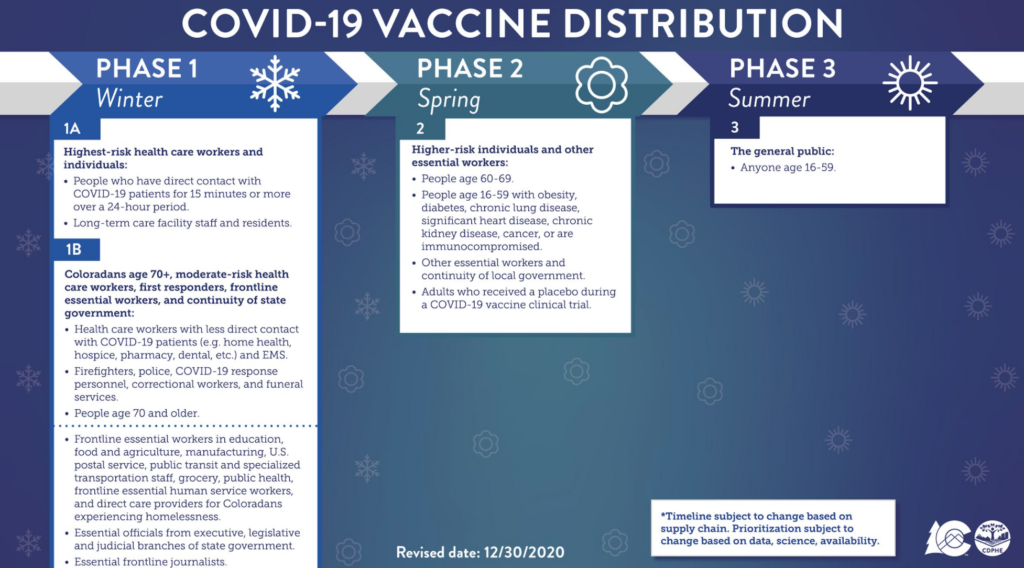
Indoor restaurant dining will soon be allowed to resume throughout Colorado after Gov. Jared Polis once again surprised local public health officials with an order announced late at night on social media.
Polis said he had asked the Colorado Department of Public Health and Environment to move counties now labeled as “Red” on the state's coronavirus dial back to “Orange” status, effective Jan. 4, 2021.
That will allow indoor restaurant dining to resume at 25 percent of normal capacity, and loosen other restrictions on gyms and offices.
“Throughout this pandemic, we have had to walk a difficult line between the public health crisis and the economic crisis,” Polis said on Twitter the evening of Dec. 30. “This. is a direct result of Coloradans stepping up and taking the steps to protect themselves and others.”
The rollback in the color-coded restriction level will apply to nearly every populous county in the state and the entire Front Range from Larimer to Pueblo, along with Mesa, Garfield and Routt counties on the Western Slope and all of Southeast Colorado too.
Polis's Tweet arrived as many county public health directors have been working long days to create “5-star” restaurant inspection programs authorized by the state to allow indoor dining with some additional inspections and criteria for restaurants to follow.
With a Tweet, some of that planning was swept aside and what is classified as “Red” today will be “Orange” on the fourth day of the new year.
Lakewood Mayor Adam Paul said he was grateful for Polis's action to loosen the reins on the economy, but troubled by the lack of communication involved in the process.
"What continues to be a challenge are decisions being made without the opportunity to communicate to the local officials who are on the front lines," Paul said. "Our county officials have been working day and night to get 5-star implemented, our businesses are going to great lengths to prepare for compliance and have many hoops to jump through then late at night a decision is made to change everything."
The 5-star program will apparently remain in effect for now, which could allow communities to let restaurants suddenly governed by orange restrictions to follow the rules set for one level down, or yellow. That would still cap capacity at 50 people, but could benefit small cafes and diners by allowing them to operate at up to 50 percent capacity, instead of 25.
"While it will continue to be important to push towards the 5-star protocols so that businesses can operate at levels less than orange we need to all be working together to share a unified message," Paul said. "Public trust is so important and it is needed more than ever during these times.”
The decision also has implications for the state's schools as the holiday break comes to a close.
At the “Red” severe risk level, in-person classes are only “suggested” for students in pre-K to grade 5. The next level down, the state encourages classes to resume in person for all grades. The decision is ultimately up to individual school districts in consultation with their local health departments, but the Polis decision is likely to increase pressure in some communities to fully re-open schools.
Polis said he made the decision based on sustained drops in COVID-19 cases across the state. That was true three days ago, but since then, the percentage of positive tests returned each day has been back on the rise, with the 7-day average moving from 6.0 percent on Dec. 26 to 6.6 on Dec. 29, the last day for which data was published.
The number of patients hospitalized has been falling, but even that decline has flattened in recent days, though Polis specifically cited the availability of intensive care beds in making his decision.
“Only 73 percent of ICU beds statewide are in use,” Polis wrote.
He did not mention the appearance of a new, more contagious, strain of COVID-19 detected by the state laboratory in a sample from a Colorado National Guardsman working in an Eastern Plains nursing home. It was the first detection of the strain in the U.S., and a second guardsman is also suspected of being infected with it.
The variant — known as the B.1.1.7 variant — does not appear to make people any sicker, but does spread more rapidly than the COVID-19 that has infected more than 330,000 Coloradans since March. And more infections will likely lead to more hospitalizations, should that variant become widespread as suspected by public health experts.
Mark Johnson, incoming president of the Colorado Medical Society and interim director of public health in Jefferson County, said he believes it is a mistake for Polis to loosen restrictions in the midst of holiday weekends, and with a still-unknown amount of the more contagious variant in the state.
"The limited resources local public health agencies have to respond to the COVID-19 virus and initiate vaccination campaigns are continually being stretched by what appear to be arbitrary changes to the dial metrics that are not shared with us prior to their announcements," Johnson wrote in a statement to CPR News. "This new surprise is not just moving the dial goalposts, but is more like changing to goalposts into a soccer net."
Johnson said it would have been better to wait and watch case numbers after the New Year begins.
"Although the metrics are currently moving in the right direction, the concerns regarding the Christmas and New Year holiday and the presence of a more infectious variant in the state leave many in local public health worried that lessening the restrictions right now will lead to increased cases and the need to once again tighten things down, thus whip-sawing businesses and adding to confusion," Johnson said.
But Polis is basing his optimism on the arrival of vaccines that provide immunity from the virus. Earlier on Wednesday, he again took local public health officials by surprise by expanding the pool of eligible vaccine recipients in category 1-B to everyone in Colorado over 70 as well as an array of workers deemed essential, like teachers, grocery store workers, transportation employees and some journalists.

That decision to add hundreds of thousands of newly eligible people to the next group to be inoculated, announced by Polis at a morning press conference, also surprised county public health directors. They are still trying to get first doses to frontline medical workers and, working with pharmacies, to local nursing home staffs and residents.
The announcement caused phones to ring at hospitals, doctors' offices and county public health agencies across the state as seniors sought to learn details about where and when they will be vaccinated — details that do not currently exist.
“We understand that people are excited and anxious to receive their vaccine,” said the Garfield County Public Health director, Yvonne Long, in a release. “We are sorry for any confusion, as the criteria for 1B changed today. Though we do not yet have enough vaccines in Garfield County to vaccinate those in the 70-plus age category, we are working on a plan to do this once we are able.”
Late Wednesday, CDPHE issued a release acknowledging the lack of detail around the expansion of eligibility and asking Coloradans to call 303-389-1687 or 877-462-2911, Monday through Friday, 9 a.m.-10 p.m. or Saturday and Sunday, 9 a.m.-5 p.m for more information on vaccine distribution “We understand that people are excited and anxious to receive their vain the coming days.”
“Several counties are planning to hold mass vaccination clinics for members of their communities," according to the same CDPHE news release. “In the coming days and as more information becomes finalized, we will publish additional locations for vaccine distribution on the state’s website.”









